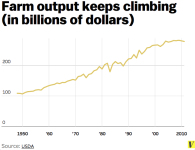DBT
Contributor
Just because Malthus was way out in terms of timing doesn't mean he was wrong in principle. Innovation, recycling, efficiency, etc, only goes so far.
Yes, he was wrong in principle.
His principle was that population would grow exponentially until such time as it would collapse from a lack of food, yet here we are nearly ten times the population when he wrote his book, with a higher per capita food availability than in his day - and yet the population has stopped growing exponentially.
The principle I was referring to is that any environment or ecosystem, being finite, can only support a given number of animals, be they human or any other species.
Population growth need not be exponential for that to be true.....it just takes longer to get to the point of unsustainability.


